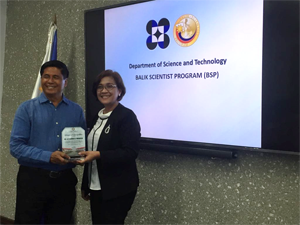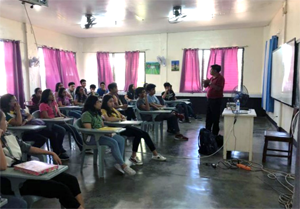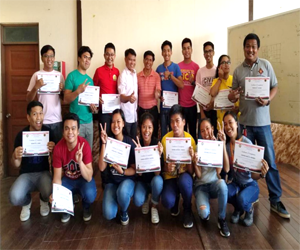 With Region I being vulnerable to the effects of climate change such as drought, the Mariano Marcos State University (MMSU) started its food-water-renewable energy self-sufficiency efforts and got a major boost through the guidance of Balik Scientist, Guillermo A. Mendoza.
With Region I being vulnerable to the effects of climate change such as drought, the Mariano Marcos State University (MMSU) started its food-water-renewable energy self-sufficiency efforts and got a major boost through the guidance of Balik Scientist, Guillermo A. Mendoza.
As a Balik Scientist, Dr. Mendoza first came to MMSU in 2010. Together with other Balik Scientists, Drs. Josefino C. Comiso, Catalino A. Blanche, and Terry I. Sarigumba, he helped the University establish the baseline information that eventually led to the development and application of climate change information systems for agriculture, forestry, and natural resources. These initial efforts helped propel MMSU as front-runner in climate change in the Ilocos Region. The university now houses the Regional R&D Center for Climate Change Studies.
This year, MMSU re-engaged Dr. Mendoza to help capacitate the University in different dimensions of climate change resiliency. This was done through trainings on suitability assessment for locating small farm reservoir, diversion dams, and small water impoundments using various computational models, and on watershed hydrologic modelling.
 Dr. Shirley C. Agrupis, MMSU President, also requested Dr. Mendoza to look into MMSU’s mapping of Nipa plantations, in connection with a bioethanol project, which is an offshoot of another Balik Scientist engagement with Dr. Fiorello B. Abenes and Dr. Sergio C. Capareda. In this activity, Dr. Mendoza assisted MMSU in obtaining high resolution planet data from the Department of Science and Technology (DOST) through the coordination with National Mapping and Resource Information Authority (NAMRIA).
Dr. Shirley C. Agrupis, MMSU President, also requested Dr. Mendoza to look into MMSU’s mapping of Nipa plantations, in connection with a bioethanol project, which is an offshoot of another Balik Scientist engagement with Dr. Fiorello B. Abenes and Dr. Sergio C. Capareda. In this activity, Dr. Mendoza assisted MMSU in obtaining high resolution planet data from the Department of Science and Technology (DOST) through the coordination with National Mapping and Resource Information Authority (NAMRIA).
Dr. Mendoza provided advice as well as developed mapping protocol and sampling design for field survey of nipa plantations using statistical tools, and later on joined in the actual field survey. He recommended for MMSU to pursue the establishment of Geomatics Center and the proposal on web-based application of small-scale irrigation system in Ilocos Region.
 Dr. Agrupis said that the Balik Scientist Program (BSP) greatly contributed in the development of MMSU. According to her, the university was able to receive more grants in renewable energy from the Department of Energy, DOST, and the Philippine Council for Agriculture, Aquatic and Natural Resources Research and Development of the DOST (DOST-PCAARRD) on climate change. Likewise, the MMSU was able to network with various universities abroad because of the interventions made by the Balik Scientists.
Dr. Agrupis said that the Balik Scientist Program (BSP) greatly contributed in the development of MMSU. According to her, the university was able to receive more grants in renewable energy from the Department of Energy, DOST, and the Philippine Council for Agriculture, Aquatic and Natural Resources Research and Development of the DOST (DOST-PCAARRD) on climate change. Likewise, the MMSU was able to network with various universities abroad because of the interventions made by the Balik Scientists.
“I am personally very satisfied with the contributions we made in this BSP stint. I am sincerely hopeful that the initiatives we started can be continued and brought to fruition,” Dr. Mendoza expressed during the Exit Report Presentation of his accomplishments done on April 26, 2019 at PCAARRD, Los Baños, Laguna. “I can’t think of better way of spending my ‘retirement’ as emeritus professor of the University of Illinois, than to be a Balik Scientist working with colleagues in the Philippines in advancing S&T in agriculture, forestry, and natural resources,” he concluded.
BSP is being implemented by DOST-PCAARRD together with DOST-Philippine Council for Health Research and Development (DOST-PCHRD), which covers Balik Scientists in the health industry and the DOST-Philippine Council for Industry, Energy, and Emerging Technology Research and Development (DOST-PCIEERD) for BSP engagements in the Industry, Energy, Emerging Technology, and Special Concerns.
